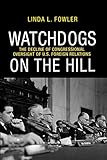Watchdogs on the Hill : The Decline of Congressional Oversight of U.S. Foreign Relations / Linda L. Fowler.
Material type: TextPublisher: Princeton, NJ : Princeton University Press, [2015]Copyright date: ©2015Edition: Course BookDescription: 1 online resource (280 p.) : 38 line illus. 17 tablesContent type:
TextPublisher: Princeton, NJ : Princeton University Press, [2015]Copyright date: ©2015Edition: Course BookDescription: 1 online resource (280 p.) : 38 line illus. 17 tablesContent type: - 9780691151618
- 9781400866465
- International relations
- Legislative oversight -- United States
- POLITICAL SCIENCE / American Government / Legislative Branch
- Abu Ghraib Prison
- Constitution
- Defense Department
- Department of Defense
- Iraq War
- Panama Canal
- Senate Armed Services Committee
- Senate Foreign Relations Committee
- Senate committee
- Senate watchdogs
- Senate
- State Department
- Truman Doctrine
- U.S. Congress
- U.S. Constitution
- U.S. foreign policy
- U.S. foreign relations
- Vietnam War
- congressional war powers
- democratic accountability
- divided government
- executive branch
- fire alarms
- foreign affairs
- foreign policy
- foreign relations
- institutional changes
- international affairs
- military casualties
- national security oversight
- national security
- police patrols
- presidency
- public hearings
- public opinion
- public understanding
- reform proposals
- rule of law
- scandals
- secret hearings
- war powers
- wars
- 328.730746 23
- JK585 .F69 2017
- online - DeGruyter
- Issued also in print.
| Item type | Current library | Call number | URL | Status | Notes | Barcode | |
|---|---|---|---|---|---|---|---|
 eBook
eBook
|
Biblioteca "Angelicum" Pont. Univ. S.Tommaso d'Aquino Nuvola online | online - DeGruyter (Browse shelf(Opens below)) | Online access | Not for loan (Accesso limitato) | Accesso per gli utenti autorizzati / Access for authorized users | (dgr)9781400866465 |
Browsing Biblioteca "Angelicum" Pont. Univ. S.Tommaso d'Aquino shelves, Shelving location: Nuvola online Close shelf browser (Hides shelf browser)

|

|

|

|

|

|

|
||
| online - DeGruyter Young Islam : The New Politics of Religion in Morocco and the Arab World / | online - DeGruyter Soft Force : Women in Egypt's Islamic Awakening / | online - DeGruyter Nations under God : How Churches Use Moral Authority to Influence Policy / | online - DeGruyter Watchdogs on the Hill : The Decline of Congressional Oversight of U.S. Foreign Relations / | online - DeGruyter War and Democratic Constraint : How the Public Influences Foreign Policy / | online - DeGruyter White Backlash : Immigration, Race, and American Politics / | online - DeGruyter The Battle for Yellowstone : Morality and the Sacred Roots of Environmental Conflict / |
Frontmatter -- Contents -- Illustrations -- Tables -- Preface -- Acknowledgments -- PART I. Information, Regular Order, and Democratic Accountability in International Affairs -- PART II. Oversight Hearings and Regular Order in U.S. Foreign Relations -- PART III. Reclaiming Congressional War Powers -- APPENDIX A. Coding Congressional Committee Hearings -- APPENDIX B. Description of Dependent and Independent Variables -- APPENDIX C. Methodological Appendix to Chapter 3 -- APPENDIX D. Methodological Appendix to Chapter 4 -- APPENDIX E. Methodological Appendix to Chapter 5 -- References -- Index
restricted access online access with authorization star
http://purl.org/coar/access_right/c_16ec
An essential responsibility of the U.S. Congress is holding the president accountable for the conduct of foreign policy. In this in-depth look at formal oversight hearings by the Senate Armed Services and Foreign Relations committees, Linda Fowler evaluates how the legislature's most visible and important watchdogs performed from the mid-twentieth century to the present. She finds a noticeable reduction in public and secret hearings since the mid-1990s and establishes that American foreign policy frequently violated basic conditions for democratic accountability. Committee scrutiny of the wars in Iraq and Afghanistan, she notes, fell below levels of oversight in prior major conflicts.Fowler attributes the drop in watchdog activity to growing disinterest among senators in committee work, biases among members who join the Armed Services and Foreign Relations committees, and motives that shield presidents, particularly Republicans, from public inquiry. Her detailed case studies of the Truman Doctrine, Vietnam War, Panama Canal Treaty, humanitarian mission in Somalia, and Iraq War illustrate the importance of oversight in generating the information citizens need to judge the president's national security policies. She argues for a reassessment of congressional war powers and proposes reforms to encourage Senate watchdogs to improve public deliberation about decisions of war and peace.Watchdogs on the Hill investigates America's national security oversight and its critical place in the review of congressional and presidential powers in foreign policy.
Issued also in print.
Mode of access: Internet via World Wide Web.
In English.
Description based on online resource; title from PDF title page (publisher's Web site, viewed 30. Aug 2021)


